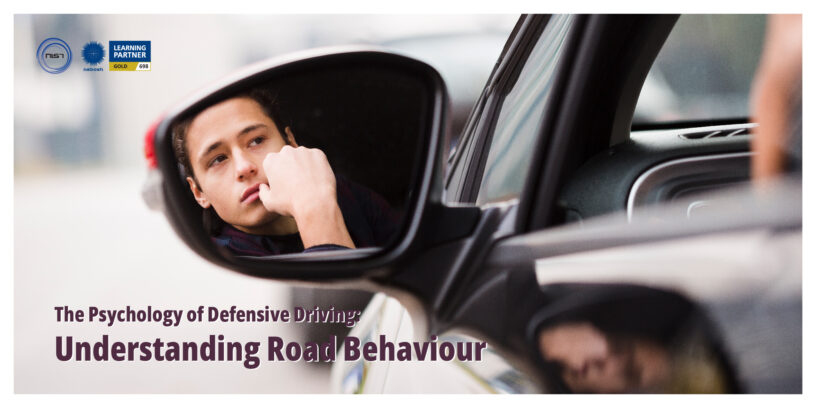Driving is more than just manoeuvring a vehicle through traffic; it’s a complex interaction of behaviours influenced by psychology, emotions, and social dynamics. In this blog, we’ll delve into the realm of the psychology involved in defensive driving, exploring the intricate factors that shape road behaviour and how a deeper understanding can contribute to safer roads for everyone.
The Mind Factor on the Road:
The mind plays a central role in driving, influencing various cognitive and psychological processes that contribute to a driver’s performance on the road. Driving involves human beings with unique personalities, emotions, and experiences. Understanding these factors is crucial in comprehending road behaviour.
1. Emotional Impact on Decision-Making:
Emotions play a significant role in driving behaviour. Stress, anger, and frustration can impair decision-making and lead to risky actions on the road. Defensive driving involves recognizing and managing one’s emotions to maintain a calm and focused mind-set.
2. Social Psychology of Driving:
Driving is a social activity, and interactions between drivers follow social psychology principles. Explore concepts such as conformity, where drivers may mimic the behaviour of others, and the impact of social norms on road conduct.
Common Psychological Challenges on the Road:
Driving can pose various psychological challenges that, when understood, can be mitigated through defensive driving strategies.
1. Risk Perception:
People perceive risks differently. Understanding individual risk perceptions is key to predicting and preventing accidents. Defensive driving involves anticipating the potential risks others may not see and adjusting one’s driving accordingly.
2. Cognitive Biases in Driving:
Cognitive biases, such as overconfidence and the illusion of control, can affect decision-making on the road. Explore how defensive driving includes recognizing and compensating for these biases to maintain a realistic assessment of one’s driving abilities.
Building a Defensive Mind-set:
Developing a defensive driving mind-set involves acknowledging the psychological factors involved and actively working to counteract potential challenges.
1. Empathy on the Road:
Understanding that everyone on the road has their own experiences and challenges fosters empathy. Defensive driving incorporates empathy by anticipating and responding to the actions of other drivers with patience and understanding.
2. Mindfulness in Driving:
Mindfulness involves being fully present and aware of the driving environment.
Defensive drivers practice mindfulness by avoiding distractions, staying focused, and continuously scanning the road for potential hazards.
The Role of Education and Training:
Defensive Driving Training plays a pivotal role in addressing the psychology of defensive driving. Training programs can equip drivers with the knowledge and skills to navigate the psychological complexities of the road.
- Emotional Intelligence in Defensive Driving Training:
Learn how emotional intelligence components may enhance drivers’ ability to manage emotions on the road. Explore how knowing emotional regulation techniques can contribute to safer driving practices.
- Behavioural Interventions:
Implement behavioural interventions that address specific psychological challenges.
Defensive driving courses incorporate knowledge on cognitive biases, risk perception, and social psychology to empower drivers with a comprehensive understanding of road behaviour.
Conclusion:
In essence, the psychology of defensive driving involves recognizing the human element in driving behaviour and adapting one’s approach to foster safer roads. By understanding the psychological factors at play, drivers can cultivate a defensive mind-set that goes beyond following traffic rules—it involves actively responding to the intricacies of human behaviour on the road. Ultimately, the fusion of psychology and defensive driving is a powerful combination that contributes to a safer and more harmonious driving environment for everyone.
Defensive Driving Training @ NIST Global
NIST Global offers defensive driving courses certified by the National Safety Council, USA, designed to improve individuals’ defensive driving skills and facilitate certification attainment. Additionally, we provide tailored defensive driving training solutions to meet the specific requirements of organizations.
For more details on defensive driving training, reach out to our customer service team at +91 8754465588 or email us at info@nistglobal.com. We are available to help!














Leave a Reply